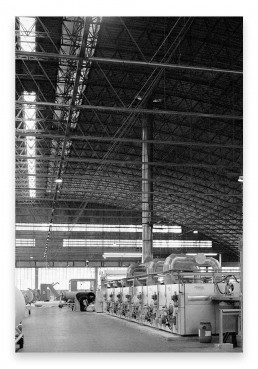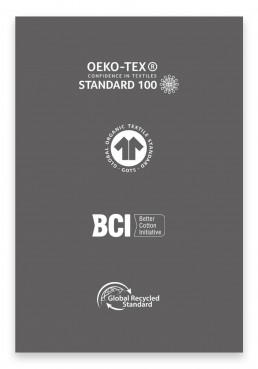
Social and environmental awareness are topics that we take very seriously.
We believe that it is an obligation to all of those who use natural resources, in our case cotton and flax, as raw material for their transformation and commercialization to have a serious commitment to protect our planet in every possible way.
It is also our duty to protect our contributors who are dedicated to their daily tasks for a common purpose. Therefore, we are not only concerned about complying with the legislation but also to overcome it whenever possible.
Due to the fact of how important it is to demonstrate our concerns, we resort our products to different certifications:
STANDARD 100 by OEKO-TEX®
It is our constant concern to ensure that our products are environmentally and socially conscious, that we do everything we can to minimize our environmental footprint and that we are socially fair, not only with our direct workers but also through a careful selection of suppliers and partners from whom we work with.
STANDARD 100 by OEKO-TEX® is an independent international certification and testing system for raw materials, intermediate and final textile products in all stages of the process, as well as used accessories.
The strict and embracing criteria’s list of STANDARD 100 by OEKO-TEX®, with several hundred individual regulated substances, and many others banned such as azo dyes, formaldehyde, pentachlorophenol, cadmium, nickel, among other substances harmful to health, even if not legally regulated and others harmful to the environment. Thus, with its decades of experience, the STANDARD 100 by OEKO-TEX® guarantees consumers a high and effective product safety.
The criteria and limit values list often clearly exceed the national and international specifications in force.
Extensive product control and regular business audits further ensure global awareness of industry sustainability and the responsible use of chemicals. Through this concept the STANDARD 100 by OEKO-TEX® has been a pioneer for many years.
GOTS
GOTS certification is the strictest in the market for organic products, integrating all stages of the textile process, from the production of the fibre to the finished product.
The cotton is produced in a biologically certified manner and all the manufacturing processes involved are inspected. Therefore, it ensures the traceability of the entire process, guaranteeing the consumer that their clothes are produced with environmentally friendly and health-friendly chemicals in factories that respect fair social criteria.
BCI
The BCI Certification (Better Cotton Initiative) aims to ensure a more sustainable future for the cotton production sector. Its main principles are: Minimize the harmful impacts of protection practices to cotton crop; Use water efficiently and watch over its availability;
Caring for soil health; Conserving natural habitats; Ensure and preserve fibre quality; Promote fair work relations.
GRS
The Global Recycle Standard (GRS) is an international, voluntary, entirely product dedicated standard that defines the requirements for outsourced certification of recycled material, production chain, social and environmental practices and chemical restrictions.
The GRS serves to meet the needs of companies that seek to verify the recycled content of their products and to verify social, environmental and chemical responsible practices in their production. The objectives of the GRS are: define the requirements to guarantee specific content characteristics, good working conditions and that harmful impacts to the environment are minimized.
